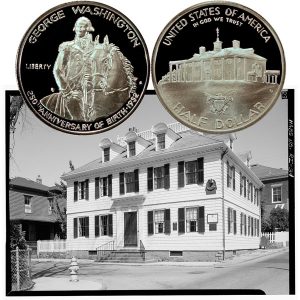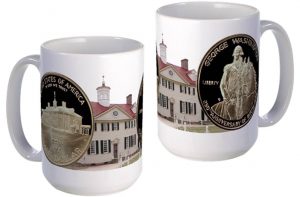Today, the George Washington Commemorative Silver Half Dollar Coin remembers when Newport, Rhode Island housed the French army and the people welcomed the American general on March 6, 1781.
From Newport: Our Social Capital by Mrs. John King Van Rensselaer, published in 1905:
=====
General Washington, attended by a brilliant suite, reached Newport March 6, 1781. They had ridden to Ringston and crossed to Conanicut, where a barge manned by local fishermen in white dresses met the commander-in chief, who landed at Barney’s Ferry on the corner of Long Wharf, where General Washington was received with due honors.
As his boat passed through the French fleet the yards were manned and a salute fired.
The army was drawn up in order for his reception, forming in two lines from the wharf to the Parade, while from Clarke to Mary Street, to William Vernon’s house, which was Comte de Rochambeau’s headquarters, the streets were lined with the officers of the navy and army and distinguished citizens.
General Washington, with the foreigners, marched between the troops, and as he reached the house he stood for a few moments to thank the people for his reception.
One little urchin called out, “Why, father, General Washington is only a man,” overhearing which, the commander-in-chief replied, “Yes, only a man.”
That evening the French had a grand torch-light procession, and the town was brilliantly illuminated.
The procession was headed by thirty boys bearing candles fixed on staffs, followed by General Washington, Comte de Rochambeau, the officers, and citizens.
The night was clear and the brilliant cortege marched through the principal streets.
As the inhabitants were so impoverished, candles were freely supplied by the municipal authorities to all who asked for them.
Next morning was devoted to anxious consultations regarding the condition of the country, and plans for a brilliant campaign were mapped out by the generals of the two countries.
But by four o’clock business was dismissed and the party assembled for dinner.
This surpassed anything ever before seen in Newport. The windows of the square dining-room in which Washington was entertained still look out on Mary Street, while the room itself is much the same as it was one hundred and twenty-five years ago, although minus the gay French flags, military trophies, and magnificent silver camp equipage with which the aides-de-camp, assisted by the French servants, adorned the room.
These aides were MM. de Lamath, Lauzan, de Closen, and de La Touche.
All the senior officers of the fleet and army were with the Americans seated at the table in the dining-room, while others were in the different parlors, etc., of the house.
A grand ball was given by the French officers that evening in Mrs. Cowley’s assembly-rooms on Church Street, three doors from Thames on the south side of the way.
The chief officers on the Committee of Arrangements were the Prince de Broglie, Comte de Segur, and Comte de Vaughan.
The room was beautifully ornamented, the decorations doing credit to the taste of M. Foteux, one of the aides of the Baron de Viomesnil.
Mr. Mason, in his “Reminiscences of Newport,” says, “To Washington the honor of opening the ball was given, and when he led out the beautiful Miss Champlin, Rochambeau and his suite took the instruments from the hands of the musicians and played the air, ‘A Successful Campaign.’
“How brilliant the scene must have been! The commanding form of Washington in his Continental uniform, at his side the lovely girl whose beauty was noted by de Segur; Rochambeau, wearing the Grand Croix de l’Ordre Royal, with Chastellux, the historian, and many others, Destouches and the notable men of the French army and navy, who found it hard to leave their partners when the hour of parting came.”
The dance of “The Successful Campaign” is described as follows: “Lead down two on the outside and up the middle, two couple do the same, turn contrary partners, cast off, right hand and left.”
This is what in England today would be called a Sir Roger de Coverley and Americans name a Virginia reel.
As soon as the conference was ended Washington returned as he came, while the French admiral embarked part of the army on the transports, which, escorted by the fleet, sailed on March 8, 1781, for Virginia, where it had been arranged that the French should co-operate with the American army.
The commander of the British fleet, which had been lurking in Gardiner’s Bay behind Montauk Point, was soon apprised by his spies that the fleet had sailed, upon which he immediately started in pursuit.
An engagement took place off Capes Charles and Henry, at the mouth of Chesapeake Bay, with the result that the French were forced to return to Newport without co-operating with their allies.
The seat of war was now at Yorktown, where the brilliant capture of Lord Cornwallis’s army is a matter of history.
The French had returned unmolested, and aided materially, so by the end of October, 1781, the inhabitants of Newport began to hope that the war was nearly over, and to draw a long breath of relief in the firm persuasion that it was indeed the breath of freedom.
=====
The George Washington Commemorative Silver Half Dollar Coin shows with an image of the Vernon House in Newport, Rhode Island, where the meeting with Rochambeau took place in early March, 1781.

